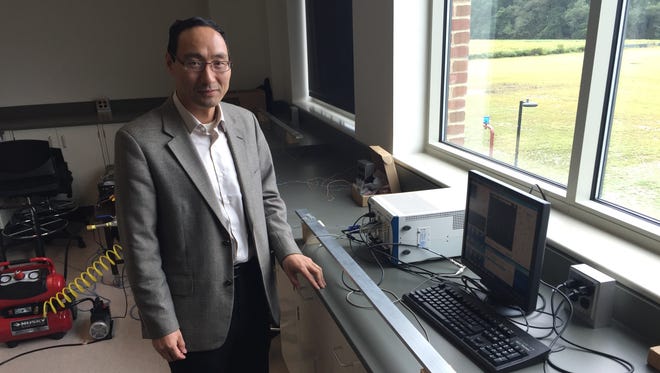UMES professor's sensor could help stop pipeline leaks

A University of Maryland Eastern Shore professor has received a patent for a sensor system he says could warn of oil pipeline leaks like last month's major spill in Alabama before they happen.
"The idea is, for the future, the structure can become smart," said Yuanwei Jin, an electrical engineering professor.
A framed copy of U.S. patent No. 9,413,571, issued Aug. 9, hangs in a third-floor conference room of the university's new Engineering and Aviation Science building.
It marks the third time UMES has been named as the primary owner of a patent, according to U.S. Patent Office online records that date back to 1976. The patent is the first outside its bread and butter of agricultural research.
"It's a new frontier for us," said Bill Robinson, a UMES spokesman.
Jin said the invention could hold the key to solving one of the oil and gas industry's most vexing problems: detecting structural flaws in underground pipes before they cause massive spills.
That issue was put in sharp relief in September when a Colonial Pipeline-owned line failed in Alabama, spilling hundreds of thousands of gallons of gas. The leak disrupted gas supplies across the Southeast and mid-Atlantic, prompting prices to rise considerably at the pump until a bypass pipe could be installed.
READ MORE: Teen's invention aims to keep cooks from slicing fingers

The only way to check on the condition of a subterranean pipe is to physically dig into the ground and inspect it, Jin said. That's costly and unfeasible to do over great distances, he added.
Jin led a group of researchers that created a network of sensors designed to pinpoint the exact location of problem spots and relay the information to computers above ground. He shares the patent with Deshuang Zhao of China and Yujie Ying, formerly of Carnegie Mellon University in Pittsburgh.
The sensors themselves are about the size of a stick of gum, with two wires attached on either end. They use the piezoelectric effect, which has been known to science since the 1880s, to transform electricity into a vibration through solid materials. Metal happens to conduct the resulting signal quite well.
The sensors can measure stresses on the pipe and changes in air pressure, among other things. The vibration generates invisible waves through the metal, which are converted into actual waves on a computer screen.
One of Jin's biggest challenges was developing a method of unscrambling the various waves after they travel from one sensor to another. Using a method with the science fiction-like name of "time reversal," Jin's system compresses the waves into a single pulse.
Any abnormalities along the length of pipe between sensors, such as excess rust or heavy stress from the earth above, will distort the signal. By using multiple sensors, observers can triangulate the signals to pinpoint the problem spot the same way police use multiple cell towers to track the location of a cellphone, Jin said.
MORE UMES NEWS: University unveils statue, museum for former president Hytche
The oil industry is just one potential client, he added. The same technology could be used to find structural issues in offshore wind turbines and airplanes, Jin suggested.
The next step: determining how the invention can be commercialized. It would be easier for the sensors to be integrated into new oil pipelines than retrofitted into existing ones, Jin said. But it may be a small price compared with the cost of fixing broken pipes and weathering the resulting economic storm.
Since UMES is the primary "assignee" on the patent, the institution controls its fate. University officials could technically choose to bring the technology to market, but the more likely scenario involves licensing it to a private company, said Ayodele Alade, dean of the School of Business and Technology.
The patent highlights the university's efforts to raise its profile as a hub of innovation, Alade added. In February, UMES announced it had qualified as a "doctoral university," a designation held by just 7 percent of the country's universities, according to the Carnegie Classification of Institutions of Higher Education.
The change is expected to make UMES eligible for additional government funding for future graduate studies and accompanying research initiatives, university officials said in a press release at the time.
410-845-4630
On Twitter @Jeremy_Cox